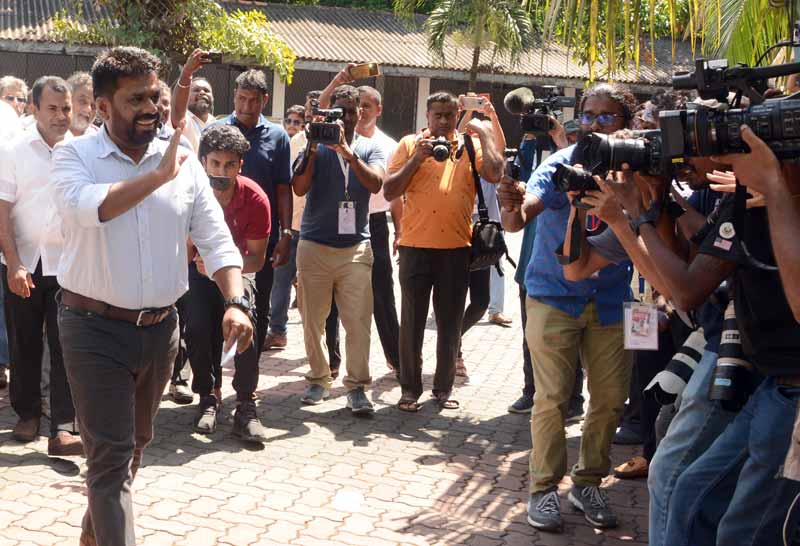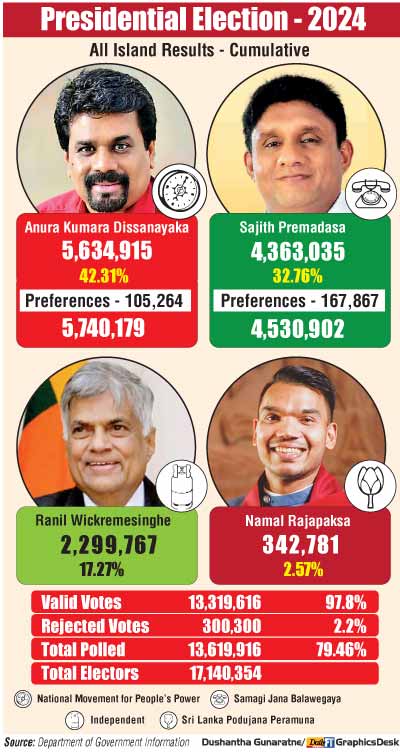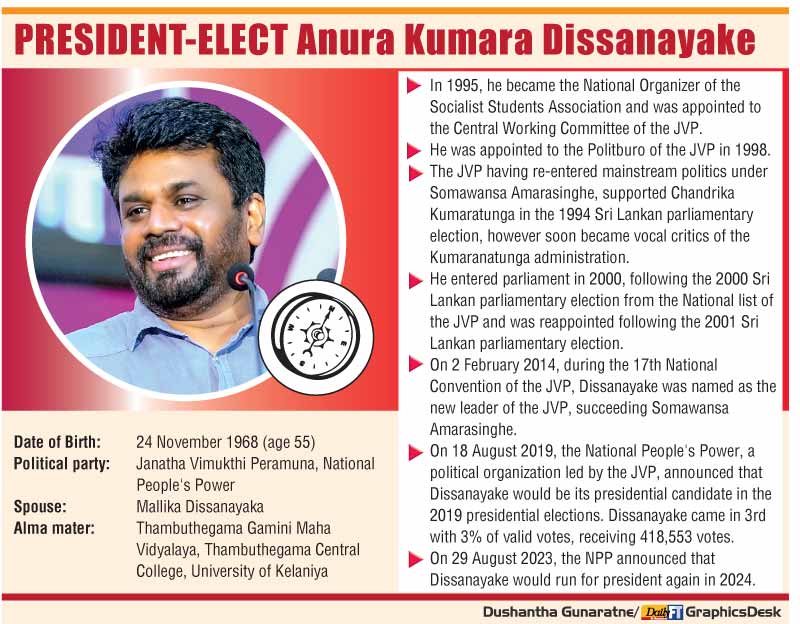Thursday Feb 19, 2026
Thursday Feb 19, 2026
Monday, 23 September 2024 04:01 - - {{hitsCtrl.values.hits}}

NPP leader Anura Kumara Dissanayake gestures as he walks in to cast his vote at the 2024 Presidential election on Saturday which he won comfortably - Pic by Gayan Amarasekara
 The popular Anura Kumara Dissanayake (AKD) will assume duties as Sri Lanka’s ninth Executive President today following a landmark victory in Saturday’s election, defeating incumbent Ranil Wickremesinghe and Opposition leader Sajith Premadasa.
The popular Anura Kumara Dissanayake (AKD) will assume duties as Sri Lanka’s ninth Executive President today following a landmark victory in Saturday’s election, defeating incumbent Ranil Wickremesinghe and Opposition leader Sajith Premadasa.
The victory, AKD’s first in two attempts, reflected his meteoric rise, which many doubted originally. National People’s Power (NPP) leader secured over 40% of the votes or over 5.6 million as opposed to a previously proven base of 3% or 418,553 votes.
Almost mirroring his slogan “Ratama Anurata or the entire country is for Anura” urban and rural voters across the nation powered AKD’s victory as he proved that the groundswell support in the run up was no hype but reality.
Analysts termed AKD’s victory proved he was the “common man’s” President whilst he also garnered more protest votes from millions (including those engaged in the peaceful Aragalaya) who were disgruntled with mainstream candidates. They noted that his 5.6 million votes represents a strong mandate in a three-cornered contest, with his competitors both having ties to one party.
AKD also secured support from all communities including non-Buddhists. He swept the Catholic belt spanning from Wattala to Chilaw as well as areas such as Muslims dominated Beruwela. However, he came third in most of the Eastern districts and performed poorly in the North, loosing several key districts.
Reaffirming his appeal to urban voters, AKD won the populous Gampaha and Colombo districts. In contrast, Sajith saw a decline in support compared to the 2019 poll which saw a landmark victory for Gotabaya Rajapaksa. AKD also won the middle and upper-middle-class areas such as Kotte, Borella, Dehiwala-Mt. Lavinia, Ratmalana, Moratuwa electorates though he lost Badulla, Digamdaulla, Nuwara Eliya, Trincomalee, Batticaloa, Vanni and Jaffna.
Separately, AKD swept the postal votes cast primarily by State sector employees, which is notable, especially in light of President Ranil Wickremesinghe’s pre-election promise of a significant salary increase for Government workers. Dissanayake’s success with this key voter group underlines the discontent that many felt toward the current Government.
For the runner up Sajith, it was a consolation win against President and former leader Ranil Wickremesinghe though he suffered his second consecutive defeat. Sajith triumphed in North and East, Nuwara Eliya, Badulla and a few other areas.
Much to the heartburn of his supporters, the majority gave thumbs down to incumbent Ranil Wickremesinghe’s claims of rescuing the country from crises and assurance of leading Sri Lanka to a developed nation by 2048. However in social media many hailed Wickremesinghe’s crucial stabilisation role noting that the incoming President stood to benefit.
In his special statement yesterday President Ranil Wickremesinghe expressed his trust that future generations will properly assess his role in leading the country, noting that his place in history will be judged over time. Wickremesinghe highlighted his efforts in saving the people from hardship and expressed hope that the new President will address the remaining challenges and emphasised that he had safely guided Sri Lanka through difficult times and that the journey must now continue under new leadership.
Wickremesinghe, who secured only 2.3 million votes (17.2%), lost support despite being the incumbent. Analysts said his unpopular economic policies, including the IMF bailout and austerity measures, as well as his perceived closeness to the Rajapaksa family, likely contributed to his weak showing. Wickremesinghe’s association with the political establishment that is blamed for the country’s economic crisis, compounded by his earlier role in Government, alienated voters across the spectrum.
Analysts opined AKD would have been relegated to non-entity had Ranil and Sajith heeded popular calls to unite during the campaign. The most vocal was former MP Thalatha Athukorala and MP Arundhika Fernando. However, egos of both Ranil and Sajith ruled over the common call. SJBers also blamed Ranil for his divisive politics and preventing a victory by Sajith. Examples cited were luring Samagi Jana Balawegaya (SJB) MPs and allegedly orchestrating a common Tamil candidate to split Sajith’s votes in North and East when the main party Tamil National Alliance (TNA) has extended their backing to SJB candidate. In a few electorates such as Maharagama, Kotte, Kaduwela and Kesbewa Ranil beat Sajith as well. Ranil also came ahead of AKD in several electorates. In the North both SJB and UnIted National Party (UNP) are under increasing pressure to revisit their stands and explore reuniting if they make any headway at the upcoming Parliamentary election.
Iconic President Mahinda Rajapaksa’s successor Namal fared poorly though coming fourth but lost the family’s home base Tangalle coming third with a mere 5,964 votes. Namal also conceded defeat to political novice Dilith Jayaweera in a few electorates.
The 2024 Presidential poll also created history by being the first to go beyond the first round as AKD failed to secure 50% of the votes in the first round. Despite Sajith winning in preferences in all 22 districts, AKD’s first round lead was far too much to change the outcome. Analysts said 4% second votes cast for the first two candidates in Colombo was relatively low whilst in other areas it was far lower.
Overall voter turnout was 79.46 % slightly lower than the 83% recorded in the 2019 Presidential election, political analysts suggest that growing frustration with politicians across party lines could have dampened enthusiasm. Many Parliamentarians had switched allegiances, supporting candidates from opposing parties, which voters viewed as opportunistic. As a result, some felt there was no clear candidate that represented their views, contributing to the lower turnout.
In the Northern and Eastern provinces, Tamil politicians were split in their endorsements of candidates, leaving many voters confused and without clear direction from their leaders.
Interestingly, former UNP MP K.K. Piyadasa, who ran without holding any major rallies, garnered 47,543 votes, primarily from the North and East. Some speculate that voters may have confused his symbol, a calculator, with Premadasa’s party.
With AKD securing the Presidency, most believe Sri Lanka has entered a new political era shaped by demands for good governance and better socio-economic development for people.
